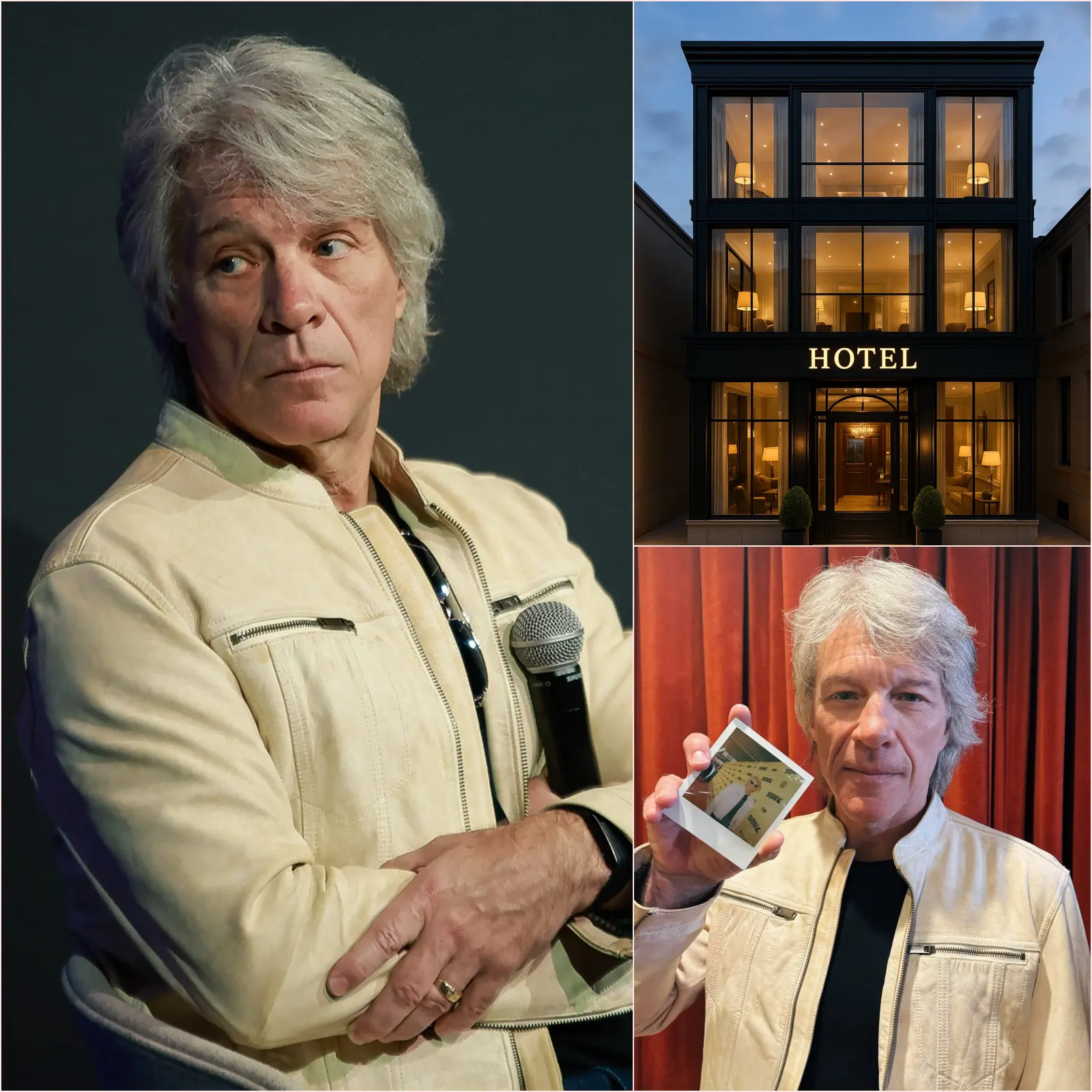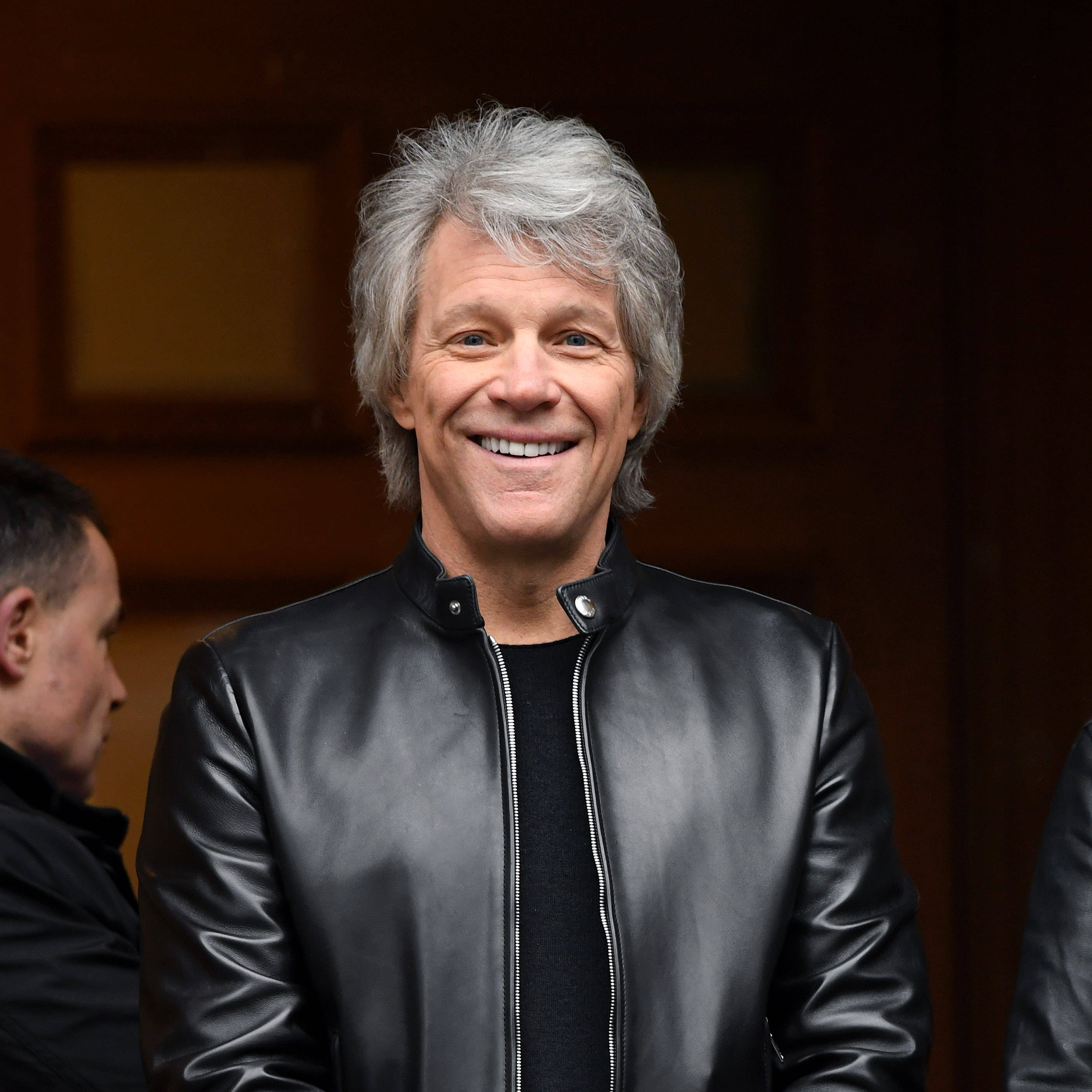A Quiet Power Move: How Jon Bon Jovi Turned a Hotel Rejection Into a Lesson in Grace

On a crisp Manhattan evening, a man wrapped in a weathered leather jacket and a simple scarf stepped through the revolving doors of one of New York City’s most exclusive luxury hotels. To the staff on duty, he looked like any other middle-aged traveler seeking a place to rest. What they didn’t realize — and what the world would soon marvel at — was that this man was Jon Bon Jovi, the New Jersey rock legend whose voice had electrified stadiums for decades.
The story that unfolded over the next 24 hours would become a masterclass in humility, composure, and quiet authority.
A Misjudgment in the Heart of Manhattan
The lobby of the hotel glowed with golden lights and whispered conversations from high-end clientele. It was a place where image spoke before words, and appearance often influenced perception.
When Jon approached the front desk, the receptionist offered a polite but dismissive smile. Seeing only a slightly tired traveler in casual clothing, she tapped her keyboard, glanced up, and delivered the rehearsed phrase:
“I’m so sorry, sir — we’re fully booked tonight. You may want to try another hotel nearby.”
There was no malice, only assumption.
But assumption can be powerful.
Jon could have corrected her.
He could have said his name.
He could have watched the color drain from her face the moment she realized her mistake.
But he did none of that.
Instead, he simply nodded, offered a gentle smile, and replied with a calm “Thank you.” Then he walked out into the hum of Manhattan — the taxis, the neon, the winter bite drifting down the avenues.
To the staff, it was just another ordinary night.
To Jon, it was a moment that needed no reaction.
The Return That No One Expected
The next day, the staff of the same hotel gathered for their morning routine. Guests checked out, new arrivals strolled in, and the familiar rhythm of the hospitality business carried on — until the front doors opened, and the man from the previous night re-entered.
This time, something felt different.
He walked with quiet purpose, carrying a folder under his arm. The receptionist recognized him instantly — and a flicker of embarrassment crossed her face. She began to apologize, but Jon gently raised a hand to stop her.
He placed the folder on the marble desk, slid it forward, and gave a small, knowing smile.
Inside were signed ownership papers.
In a calm, unmistakable voice, he said:
“Looks like a Jersey boy belongs here after all.”
The lobby fell silent.
Employees stared.
No one knew what to say.
Jon wasn’t smug.
He wasn’t gloating.
He wasn’t even angry.
He stood there with the quiet dignity of a man who understood exactly who he was — and had nothing to prove.
No Anger, No Ego — Just Grace
What made the moment unforgettable wasn’t the twist — it was the way Jon handled it.
There was no raised voice.
No demand for respect.
No public humiliation.
He didn’t shame the staff. He didn’t recount what happened the night before. Instead, he demonstrated a lesson many people spend years learning:
Power is most meaningful when it doesn’t require volume.
Jon Bon Jovi’s legacy has always rested not just on his music, but on his character. He has spent decades supporting communities, veterans, and families in need through his Soul Foundation. He has built restaurants where people pay what they can. He has given quietly, consistently, without spectacle.
This moment fit perfectly into the narrative of who he has always been — a man who leads by example, not by force.
A Story That Spread for All the Right Reasons
Word of what happened traveled quickly — first among staff, then among guests, and eventually across social media. But unlike many celebrity encounters that spark controversy or criticism, this one inspired something rare:
Admiration.
People weren’t impressed that Jon bought a hotel.
They were impressed by how he responded when he was misjudged.
He didn’t punish the staff.
He didn’t weaponize wealth or fame.
He didn’t demand recognition.
He simply returned with grace — and let his actions speak louder than any insult ever could.
One employee described the moment as “a wake-up call about humility.”
Another called it “the most respectful power move I’ve ever seen.”
Why This Story Resonates

In an age where viral stories often depend on outrage or confrontation, Jon Bon Jovi’s quiet response struck a different chord. It reminded people of something simple yet profound:
You don’t need to announce who you are when you already know it.
The staff judged him by appearance — a lesson many recognized in their own lives. The next day, he showed that dignity isn’t about demanding respect, but carrying yourself in a way that naturally earns it.
Jon didn’t return for revenge.
He returned because he had business there — and because life has a poetic sense of timing.
A Legacy Built Not on Noise, But on Integrity
As a man who rose from New Jersey bars to global stages, Jon Bon Jovi has never forgotten his roots. The leather jacket. The humility. The steady voice. The unshakable identity.
Buying the hotel wasn’t the headline.
The headline was the way he handled being underestimated.
In the end, the story becomes a reflection of who he has always been:
A legend not because of fame —
but because of character.
And as he walked through the lobby that second day, with staff watching in stunned silence, one truth became undeniable:
Some men don’t need to remind the world who they are.
The world already knows.

